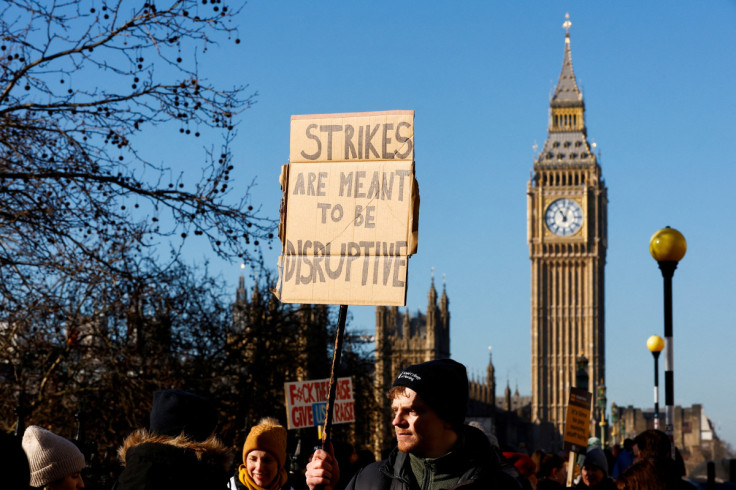Junior Doctors' Strikes Impact Emergency Services During Festive Season
The Gloucestershire Hospitals NHS Trust, responsible for managing the Cheltenham A&E, has announced the closure until 8 am on Saturday, 23 December.

The accident and emergency department at a hospital in the west of England has faced temporary closure due to strike action by junior doctors.
Additionally, the Gloucestershire Hospitals NHS Trust has announced the closure of Cheltenham A&E during specific periods, creating concerns about the potential disruptions in healthcare services, especially during the festive season.
This closure is part of a series of strikes planned by junior doctors as they continue to grapple with issues related to pay and working conditions. This article delves into the details of the temporary closure, the reasons behind the strikes, and the broader implications on the healthcare system.
The Gloucestershire Hospitals NHS Trust has implemented a temporary closure of Cheltenham A&E, affecting the provision of services from now until 8 am on Saturday, December 23.
Furthermore, the closure will be reinstated from 8 pm on Monday, January 1, until 8 am on Tuesday, January 9. This decision has substantial implications, as it not only affects the accident and emergency department but also suspends the operation of the minor injury and illness unit (MIIU) during these periods.
Cheltenham General Hospital's A&E unit will undergo a transition to an MIIU service from 8 am to 8 pm on specific dates, including Saturday, December 23, to Monday, January 1, 2024, with overnight closure. The trust emphasizes that life-threatening conditions, serious injuries and other emergency care services will be centralized at Gloucestershire Royal Hospital 24/7 throughout the specified period.
The strikes by junior doctors are part of an ongoing dispute over pay, working conditions, and the overall treatment of healthcare professionals. The 'Industrial action update: December and January' outlines the planned strikes by junior doctors, with a three-day strike scheduled from 7 am on Wednesday, December 20, until 23 December and another six-day strike from Wednesday, January 3, until Tuesday, January 9.
Dr. Ananthakrishnan Raghuram, Chief Medical Officer at NHS Gloucestershire, expressed regret about the disruptions, citing the challenges these strikes pose to the local NHS, especially during the busiest time of the year.
"The latest round of strikes at the busiest time of the year will bring substantial challenges to the local NHS, particularly hospital services and we are sorry that many patients will experience disruption to services," Dr Raghuram said.
Rishi Sunak, on behalf of the government, expressed disappointment over the strikes and questioned why junior doctors are not accepting agreements reached with other public sector workers.
He highlighted that the government has successfully negotiated with various parts of the public sector, including nurses and consultants, leaving junior doctors as the only group yet to reach a settlement.
Speaking to the Commons Liaison Committee, he said: "We have now reached a resolution with every other part of the public sector and every other part of the NHS, so over a million workers through the Agenda for Change deal that we did several months ago, including all our nurses and then most recently with consultants and the other doctor grades."
"The only remaining people who have not settled are the junior doctors," Sunak added.
The strikes have raised concerns about the impact on healthcare services, particularly during the winter season when the NHS faces increased pressure due to a surge in illnesses, staff shortages and a lack of social care support.
Hospital bosses claim that the strikes have strained the relationship between junior doctors and consultants, increasing the risk of patients facing difficulties during the industrial action. The 28 days of strikes earlier in the year and the additional nine days of strikes scheduled have left senior colleagues feeling worn out from covering the workload during these periods.
The British Medical Association's junior doctors committee co-chairs, Dr Rob Laurenson and Dr Vivek Trivedi, responded to the government's stance, stating that the strikes could be avoided if a credible offer is presented. They urged the government to engage in meaningful dialogue and stressed the need for necessary investment in staff to prevent crises, particularly during the winter months.
Despite the tensions and challenges, the BMA rejected a last-minute plea from health charities, patient groups and NHS leaders to reconsider the strikes and continue working during this critical period. The union remains steadfast in its commitment to securing a "fairer deal" for the service and the well-being of junior doctors.
Looking ahead, the announcement of junior doctors in Wales planning a 72-hour walkout from January 15 adds another layer of complexity to the ongoing challenges faced by the NHS.
© Copyright IBTimes 2025. All rights reserved.






















